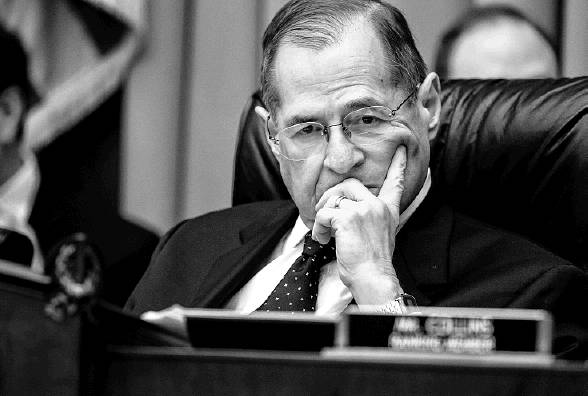Dems turn up heat on Barr
House panel OKs contempt for AG over full Mueller report
By Nicholas Fandos NEW YORK TIMES
WASHINGTON — The House Judiciary Committee voted Wednesday to recommend that the House hold Attorney General William Barr in contempt of Congress for failing to turn over Robert Mueller’s unredacted report, hours after President Donald Trump asserted executive privilege to shield the full report and underlying evidence from Congress.
The committee’s 24-16 contempt vote, taken after hours of debate over the future of American democracy, was the first official action to punish a government official in the standoff over the Mueller report. The Justice Department decried the move as an unnecessary and intended designed to stoke afight.
After the vote, the Judiciary Committee chairman, Rep. Jerrold Nadler, D-N.Y., swatted away questions about possible impeachment, but added, “We are now in aconstitutional crisis.”
The contempt vote raised the stakes in the increasingly tense battle over evidence and witnesses as Democrats investigate Trump over behavior detailed by Mueller, the special counsel. By the day’s end, it seemed all but inevitable that the competing claims would have to be settled in the nation’s courts rather than on Capitol Hill.
“Our fight is not just about the Mueller report — although we must have access to the Mueller report,” Nadler said during a debate. “Our fight is about defending the rights of Congress, as an independent branch, to hold the president, any president, accountable.”
The Justice Department, the White House and House Republicans lined up to contest that claim, shooting back that Democrats were the ones abusing their powers to manufacture a crisis.
In a statement, a spokeswoman for the Justice Department, Kerri Kupec, deplored the contempt vote as “politically motivated and unnecessary,” and the two sides traded blame over who had cut off weeks of negotiations over a possible compromise.
“Regrettably, Chairman Nadler’s actions have prematurely terminated the accommodation process and forced the president to assert executive privilege to preserve the status quo,” Kupec said. “No one, including Chairman Nadler and his committee, will force the Department of Justice to break the law.”
Though Trump has repeatedly tried to withhold information from Congress, and pledged to object to all House subpoenas, the executive privilege assertion is his first use of the secrecy powers as president.
Barr voluntarily released a redacted version of the special counsel’s 448-page report voluntarily last month, which concluded that despite ample efforts by the Kremlin, the Trump campaign did not conspire with Russia to undermine the 2016 presidential election. Mueller also laid out at least 10 instances of possible obstruction of justice, and said he could not make a traditional judgment because of various legal constraints.
But Democrats say Barr’s version is not good enough, and they have accused the attorney general of stonewalling a legitimate request for material they need to carry out an investigation into possible obstruction of justice and abuse of power by Trump. The Democrats’ request includes secretive grand jury information and other evidence.
The committee’s 27-page contempt report lays out the committee’s need for the report and offers an accounting of attempts to get Barr to share the materials first voluntarily and then under subpoena.
The Justice Department had tried to stave off the committee vote, offering to lawmakers some concessions around a less redacted version of the Mueller report that Democrats ultimately deemed insufficient.
The Justice Department had other objections to the subpoena. Compliance would require the department to violate “the law, court rules, and court orders” as well as grand jury secrecy rules, a Justice Department official, Stephen Boyd, wrote. Republicans in the Judiciary Committee hearing room returned to that point again and again as they accused Democrats of putting Barr in an untenable situation of choosing between their subpoena and the law.
But Democrats said they did not expect Barr to break the law and unilaterally release grand jury secrets, but rather to join them in petitioning a judge to unseal material for the grand jury for committee use.
Nadler said after the vote that Democrats intended to go to the judge on their own authority.
Democrats view the president’s privilege claim as bunk, since much of the report and evidence have either been released publicly or shared with lawyers in the special counsel case.
Still, Trump’s invoking of privilege for the first time as president could tie up the material in court and significantly complicate Democrats’ efforts to call other witnesses. Nadler said Wednesday it could delay a potential hearing with Mueller himself in the Judiciary Committee. And it could also limit testimony by Donald McGahn, a former White House counsel and key witness in the special counsel’s investigation, scheduled under subpoena for May 21.
Democrats’ frustration in the hearing room was clear. “I can only conclude that the president now seeks to take a wrecking ball to the Constitution of the United States of America,” said Rep. Sheila Jackson Lee of Texas.
Republicans rose one after another to defend the attorney general and urge the Democrats to turn their investigative focus to the origins of what they see as a special counsel investigation cooked up to smear the president.
Rep. Jim Sensenbrenner, R-Wis., who was one of the “managers” of President Bill Clinton’s impeachment, criticized Democrats for lending support to a “character-assassination squad running around this town” sullying innocent people.
